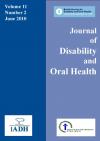Journal of Disability and Oral Health

- Cover Date:
- June 2010
- Print ISSN:
- 1470-8558
- Vol:
- 11
- Issue:
- 2
Tributes
James Neil Swallow BDS MDS James Neil Swallow, known as Neil, died on 29 April 2010 at the age of 78. Neil’s name was synonymous with paediatric dentistry for dental students of my generation. He authored the archetypal paediatric dentistry textbook that many people may remember – Child Dental Health. A practical introduction by PJ Holloway, JN Swallow and GL Slack. At a time when there was very little interest in the oral health of people with a disability, Neil established clinics for children with disabilities at the London Hospital and at Dr Barnardo’s Home, and consulted for the Bobaths at their London centre for children with cerebral palsy in the late 1950s and early 1960s In 1964, Neil was appointed as the founding senior lecturer in Children’s Dentistry at the then new Cardiff Dental School. There he established a teaching programme in Paediatric Dentistry (using role play to help students understand patients’ and parents’ experiences); he developed a dental service for both children and adults with a disability and in 1967, he published his MD thesis on the oral health of people with disability. The Wednesday morning clinics were famous in the dental school with up to 200 patients of all ages and with all types of disability and/or medical conditions booked in and as many staff and final year students as were available providing their dental treatment. In 1975, Neil became Professor of Paediatric Dentistry at the University of Amsterdam where he continued the tradition of providing oral care for children and adults with disability. He taught the undergraduates that, contrary to general belief in Holland at that time, the use of local anaesthesia assisted the delivery of children’s dentistry with the benefit that children stopped crying and were easier to treat. He established a community based
clinic in the old part of Amsterdam where the dental therapists he trained provided children’s dentistry. Around 1980 he was appointed to Professor of Restorative Dentistry at Belfast Dental School, once again establishing a comprehensive dental service for people with disability. On return to England, Neil and his wife Barbara opened a dental practice in their home. Barbara ran it while Neil acted as a consultant to the practice and house husband to Barbara and their two children. Although a paediatric dentist by repute, Neil was one of the founding fathers of Special Care Dentistry and I was fortunate enough to work with him in Cardiff and Amsterdam. He influenced the career direction of many undergraduates and newly qualified dentists, and amongst them were myself and Sue Greening. Neil was a man ahead of his time and like many trailblazers his innovative ideas were not always appreciated until much later. His funeral service was a musical celebration of his life. The Right Reverend Bill Ind spoke fondly of Neil. His words that ‘Neil loved to discuss and debate but he always set out to win’ brought back warm memories of Neil running intellectual rings round some people, all the time with a mischievous twinkle in his eyes. Janice Fiske
Liana Zoitopoulos Dr. Liana Zoitopoulos was born in Athens, Greece however, due to her father’s long-standing professional commitments in Liverpool, Liana received both her primary and sixth form education in the city before studying at Liverpool University, receiving her Bachelor of Dental Surgery in 1980. Following qualification, Liana embarked upon a career in the Community Dental Service, initially as a vocational trainee in the Cheshire Area Health Authority Community Dental Service and then taking up a dental officer position in Halton. Liana’s career progressed rapidly and within five years of qualification she became Assistant
- Article Price
- £15.00
- Institution Article Price
- £
- Page Start
- 51
- Page End
- 51
- Authors
Articles from this issue
- Title
- Pg. Start
- Pg. End
- Dental health research (1997-2007) concerning people with learning disabilities: a systematic review addressing the extent to which they are involved in research
- 91
- 96
